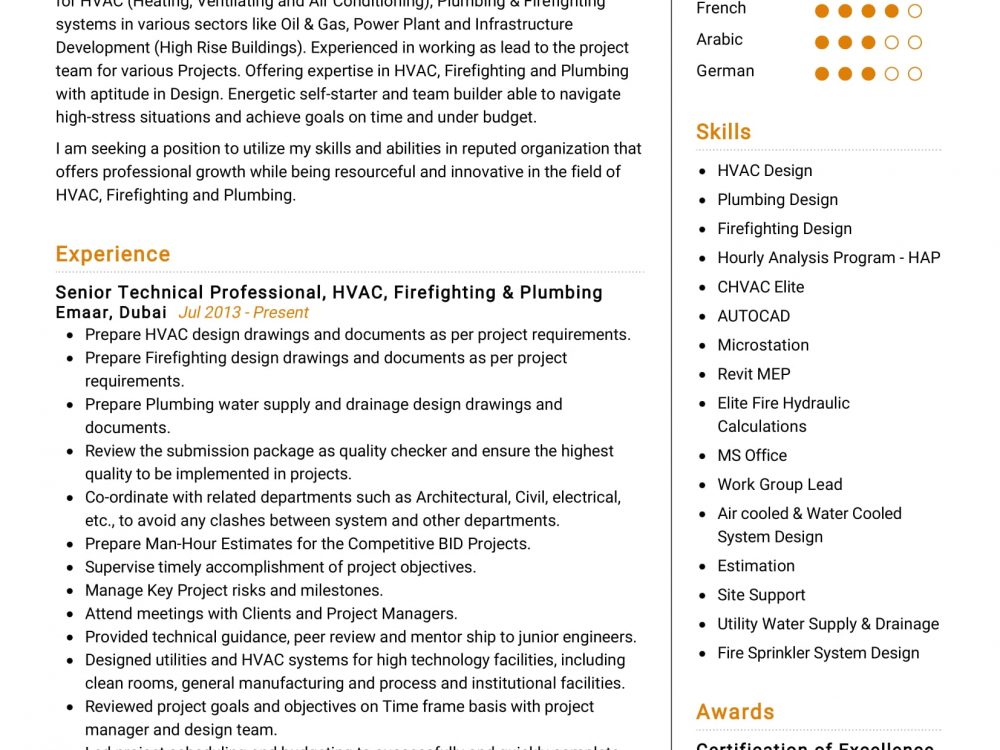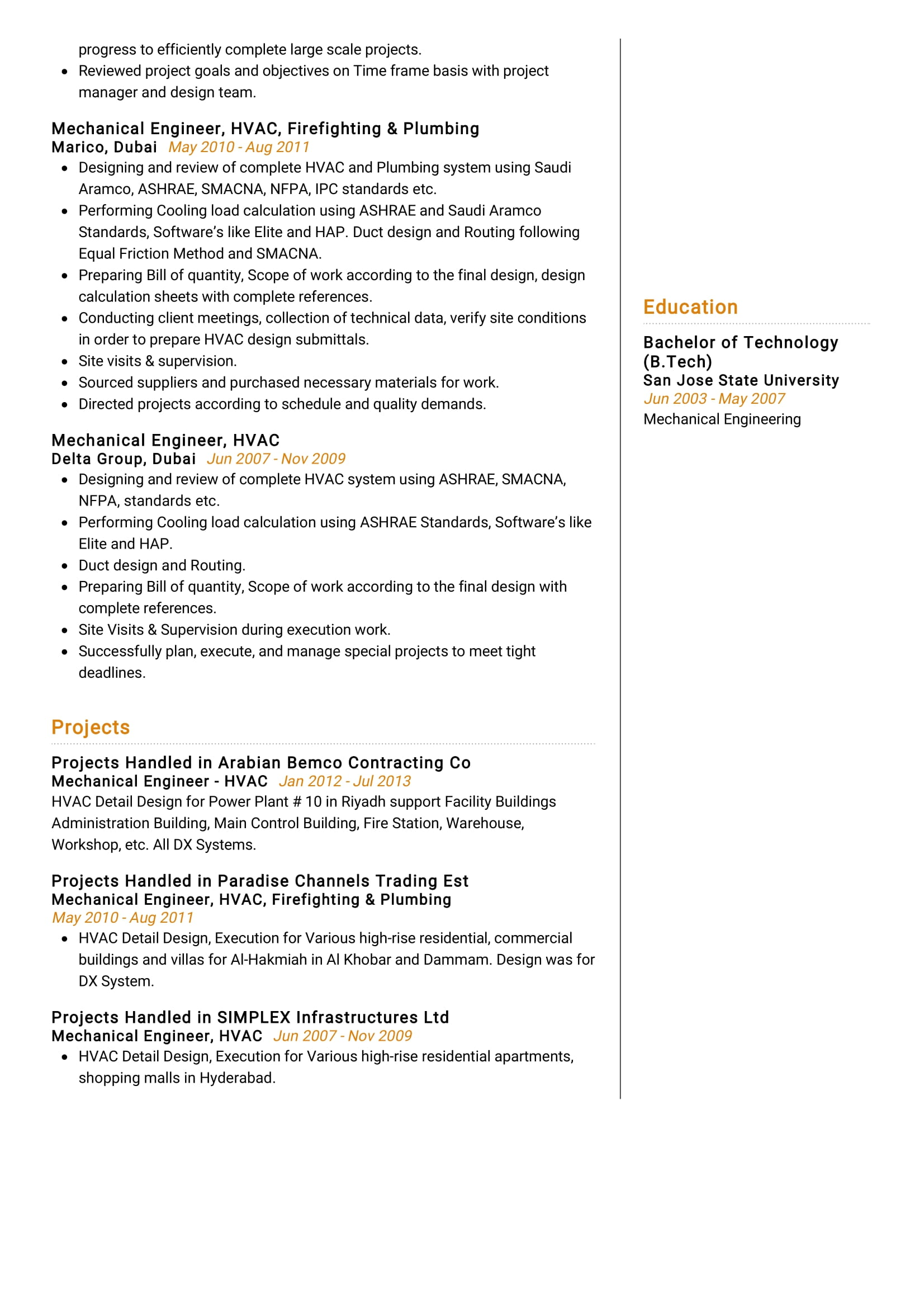

Are you an HVAC Engineer by profession and looking for a career change? We have good news for you! use our job-winning professional HVAC Engineer Resume template. You don’t have to start writing from scratch. Just click “Edit CV” and modify it with your details. Update the template fonts and colors to have the best chance of landing your dream job. Find more Resume Templates.


Twelve (12) years of comprehensive experience in FEED and Detail design projects for HVAC (Heating, Ventilating and Air Conditioning), Plumbing & Firefighting systems in various sectors like Oil & Gas, Power Plant and Infrastructure Development (High Rise Buildings). Experienced in working as lead to the project team for various Projects. Offering expertise in HVAC, Firefighting and Plumbing with aptitude in Design. Energetic self-starter and team builder able to navigate high-stress situations and achieve goals on time and under budget.
I am seeking a position to utilize my skills and abilities in reputed organization that offers professional growth while being resourceful and innovative in the field of HVAC, Firefighting and Plumbing.
HVAC Detail Design for Power Plant # 10 in Riyadh support Facility Buildings Administration Building, Main Control Building, Fire Station, Warehouse, Workshop, etc. All DX Systems.
When writing a resume for a HVAC engineer position, it is important to include the most relevant information to increase your chances of being hired. Your resume should provide a clear and concise overview of your qualifications and experience. There are specific items that all employers look for when reviewing HVAC engineer resumes.
The most important aspect of your resume is to list your professional experience. This should include any past and current positions related to HVAC engineering that you have had. Be sure to include any areas of specialty, such as design and installation of HVAC systems. Having a portfolio of successful projects can also be beneficial when trying to get hired as an engineer.
It is also important to list any certifications, licenses, or other credentials that you may have related to HVAC engineering. This shows potential employers that you have the necessary knowledge and skills to be a successful HVAC engineer. Be sure to include any specialized trainings and certifications that are relevant to the position you are applying for.
In addition to the professional experience, include a summary of your education. This should include any undergraduate or graduate degrees that you have earned as well as any certifications related to HVAC engineering. If you have completed any online or in-person HVAC engineering courses, include this information as well.
When listing your technical skills, make sure they are related to HVAC engineering. This could include CAD design, welding, and system troubleshooting. Also include any soft skills you may have related to HVAC engineering, such as problem solving, critical thinking, and communication.
Finally, list any awards, recognitions, or honors that you have received related to your HVAC engineering experience . This could include awards from industry organizations, recognition from employers, and any special recognition for your work.
If you’re looking to land an HVAC engineer job, having the right skills on your resume is essential. HVAC engineers are responsible for designing, installing and maintaining heating, ventilation, and air conditioning systems. As such, it’s important to make sure that your resume includes all the necessary skills for the position.
For starters, having some knowledge of the workings of a variety of HVAC equipment is essential. An HVAC engineer should be familiar with the major components of a system, such as the condenser, evaporator, compressor, air filter, and cooling tower. Additionally, you should be able to identify and describe how the various components interact with each other.
It’s also important to have knowledge of the relevant computer programs used in the industry. This includes being able to use CAD software to design HVAC systems, as well as knowledge of spreadsheet programs to analyze data. You should also be familiar with the local building codes and regulations related to HVAC systems, especially when it comes to installation and maintenance.
On top of these technical skills, employers are always looking for HVAC engineers who know how to troubleshoot and diagnose problems. Having knowledge of the different types of issues that can arise and how to fix them is essential. Additionally, possessing strong communication and problem-solving skills will help you stand out.
Ultimately, when crafting your resume for an HVAC engineer position, make sure to highlight the skills that are most important and relevant to the job. Doing this will demonstrate to employers that you have what it takes to be successful in the role.
HVAC (Heating, Ventilation and Air Conditioning) engineers are responsible for designing, installing and maintaining systems that control the temperature and humidity of indoor environments. They also ensure that these systems are energy-efficient, reduce pollution and adhere to safety regulations. HVAC engineers are often required to work outside normal business hours when needed, as some systems may require urgent repair or maintenance.
To become an HVAC engineer, you must have a bachelor’s degree in engineering or a related field. You must also possess an understanding of the principles of thermodynamics, ventilation and refrigeration, as well as the ability to read and interpret blueprints and schematics. Additionally, experience in the field may be beneficial.
On the job, HVAC engineers are responsible for a variety of tasks, such as design, installation and repair of heating, air conditioning and ventilation systems. They must also be able to inspect existing systems and make recommendations to increase efficiency and reduce energy costs. HVAC engineers are also responsible for demonstrating and teaching the proper operation and maintenance of systems to customers. Additionally, they may be called upon to troubleshoot and diagnose system malfunctions.
While the ability to use tools and equipment is important, HVAC engineers must also have strong communication and customer service skills. Having knowledge of advanced computer programs is also beneficial.
Ultimately, the job of an HVAC engineer is vital to the comfort and safety of indoor environments. They play a key role in the design and maintenance of systems that ensure occupants are safe, comfortable and healthy.
When writing a resume for a job as an HVAC Engineer, you want to create an objective statement that presents your experience and qualifications in the best light. A good objective statement should be concise, yet convey all of the key information that will help you stand out from the crowd.
A great objective statement for a HVAC Engineer resume should include your certifications, qualifications, and any other relevant experience. It should also make clear your desire to work in the HVAC field and to advance your career in the industry. Examples of a good objective statement can include, “Seeking a position as an HVAC Engineer with a focus on energy efficiency and technology advancements” or “Experienced HVAC Engineer looking to use my expertise in the development of innovative solutions.”
In addition, it is important to state your desired position in the HVAC industry. If you are looking for a role as a Design Engineer, a Technician, or a Project Manager, be sure to include that in your objective statement. This helps employers determine if you are the right fit for the position.
Finally, it is important to keep your objective statement specific and to the point. Avoid using overly-wordy language that could make your resume longer than necessary. Remember, you want to make a great first impression, so be sure to choose words that accurately describe your experience and goals.
The career prospects for an HVAC engineer are excellent. HVAC engineers are in high demand in most parts of the world due to their ability to design, install, maintain, and repair complex heating, ventilation, and air conditioning (HVAC) systems. As a result, they enjoy a wide range of job opportunities in both the private and public sector.
HVAC engineers are primarily responsible for designing, installing, and maintaining a home or business’s HVAC system. This includes calculating the space’s airflows, developing the best way to heat and cool the space, and installing the system. In addition, they may also be responsible for inspecting, testing, and calibrating the system to ensure it is running smoothly and efficiently.
HVAC engineers can also find job opportunities in the renewable energy sector, as well as in energy efficiency and conservation. As climate change continues to be a significant global concern, more and more organizations are seeking out HVAC engineers who can help them reduce their carbon footprint. HVAC engineers can contribute to this goal by helping to design and install HVAC systems that use renewable energy sources, or that employ energy-saving technologies.
In addition to their technical abilities, HVAC engineers must also be excellent communicators and have strong problem-solving skills. They must be able to work well with other engineers, contractors, and customers, as well as be able to identify and solve a variety of complex problems.
The demand for HVAC engineers is expected to continue to increase in the coming years, making it an excellent career choice for those who possess the necessary skills and knowledge . As climate change continues to be a significant global concern, HVAC engineers are invaluable in helping organizations reduce their carbon footprint and make the transition to a more sustainable future.
They can help design and install HVAC systems that use renewable energy sources, such as solar, wind, or geothermal power, as well as those that employ energy- efficient technologies. Additionally, HVAC engineers have the ability to develop and implement innovative solutions to reduce energy consumption and improve air quality. In addition to their technical abi-HVAC engineers must have a strong understanding of a variety of scientific, engineering, and technical principles related to heating, ventilation, and air conditioning systems.
When it comes to crafting a strong HVAC engineer resume, there are a few key takeaways to keep in mind. First and foremost, it is essential to highlight your technical expertise. As an HVAC engineer, you should be able to demonstrate a deep understanding of the principles and practices of HVAC systems, and you should be able to describe specific projects you have completed. Additionally, you should be able to detail any certifications or licenses you possess that are relevant to the job.
Furthermore, you should be able to demonstrate a commitment to energy conservation and environmental protection. HVAC engineers should have an understanding of current energy consumption trends, and they should be able to describe specific strategies they have implemented to reduce energy consumption and improve air quality. Finally, it is important to emphasize any academic achievements or certifications that are relevant to
Another important factor to keep in mind when writing your resume is to ensure that the design is professional and easy to read. Your resume should be formatted in a manner that logically and clearly outlines your professional accomplishments and qualifications. Additionally, be sure to add a brief summary of your background and qualifications at the top of your resume so that employers can quickly get a sense of what you can bring to the table.
HVAC engineers should have a comprehensive knowledge of the principles of heating, ventilation, air conditioning, and refrigeration. They should be able to identify and correct problems related to these systems, accurately design and install HVAC systems, and understand the importance of energy efficiency and environmental protection. Moreover, HVAC engineers should have an understanding of
Finally, when writing your HVAC engineer resume, it is crucial to emphasize and quantify your accomplishments. Be sure to include any awards or recognition you have received, and provide detailed descriptions of any projects you have worked on. Showcasing your achievements in a clear and concise manner will help to make your resume stand out.